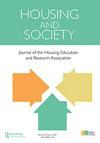Exploring aging in place inquiry through the lens of resilience theory
Q2 Social Sciences
引用次数: 2
Abstract
ABSTRACT Many late-life older adults prefer remaining in one’s home among familiar and comforting surroundings until life’s end. However, this may be a challenging pursuit due to accelerating physical and cognitive declines. Researchers, designers, and care providers grapple to identify strategies which best support aging in place. Resilience theory offers a new lens which has not been explored by previous researchers. Through observations and interviews, we explored what adaptive qualities and actions ten late-life older adults utilized to age in place. Results show that the interviewees applied personal resilience across a range of challenges. We discuss vignettes within a framework of established theories which address successful alignment of person-environment (P-E) transactions and situate our findings within foundational and nascent explorations of resilience theory. We explore the need to investigate resilience as a distinguishable personal factor which greatly impacts late-life aging in place. Because resilience includes protective factors as well as adaptive processes, it adds to the current discourse of how resilient late-life older adults utilize personal agency and goal direction to proactively sustain daily living at home. Finally, we propose the term habitational resilience to encompass the connection between personal adaptiveness and resulting effective interactions within the home environment.通过弹性理论的视角来探索老化
摘要许多晚年的老年人更喜欢呆在熟悉舒适的环境中,直到生命结束。然而,由于身体和认知能力的下降速度加快,这可能是一项具有挑战性的追求。研究人员、设计师和护理人员努力确定最能支持老龄化的策略。弹性理论提供了一个新的视角,这是以前的研究人员没有探索过的。通过观察和访谈,我们探讨了十位晚年老年人在原地衰老时所采用的适应素质和行动。结果显示,受访者在一系列挑战中运用了个人韧性。我们在既定理论的框架内讨论了小插曲,这些理论涉及人与环境(P-E)交易的成功协调,并将我们的发现置于韧性理论的基础和新生探索中。我们探讨了将恢复力作为一种可区分的个人因素来研究的必要性,这种因素对晚年衰老有很大影响。由于韧性包括保护因素和适应过程,它增加了当前关于老年人如何利用个人能动性和目标方向主动维持日常生活的讨论。最后,我们提出了“习惯弹性”一词,以涵盖个人适应能力与家庭环境中由此产生的有效互动之间的联系。
本文章由计算机程序翻译,如有差异,请以英文原文为准。
求助全文
约1分钟内获得全文
求助全文
来源期刊

Housing and Society
Social Sciences-Urban Studies
CiteScore
2.30
自引率
0.00%
发文量
10
期刊介绍:
Housing and Society is the journal of the Housing Education and Research Association (HERA). The journal supports the mission of HERA by providing for the dissemination of research and other scholarly work. Submissions from a broad range of perspectives are encouraged. Topics in housing include: policy, design, social aspects, gerontology, behavioral aspects, energy/environment, equipment, interiors, economics, theory/model development, education, and program development or evaluation. The journal welcomes the submission of original research articles, notes and commentaries. Notes are shorter manuscripts presenting succinct information on housing related to one of the following categories: - Research: exploratory or not heavily theory-based or statistically analyzed - Academic: innovative teaching ideas - Program: development, implementation, and/or evaluation of Cooperative Extension or other housing programming efforts - Policy: examination of policy impact, comparative analysis, and/or need to achieve housing goals - Reviews: books, documentaries, etc.
 求助内容:
求助内容: 应助结果提醒方式:
应助结果提醒方式:


